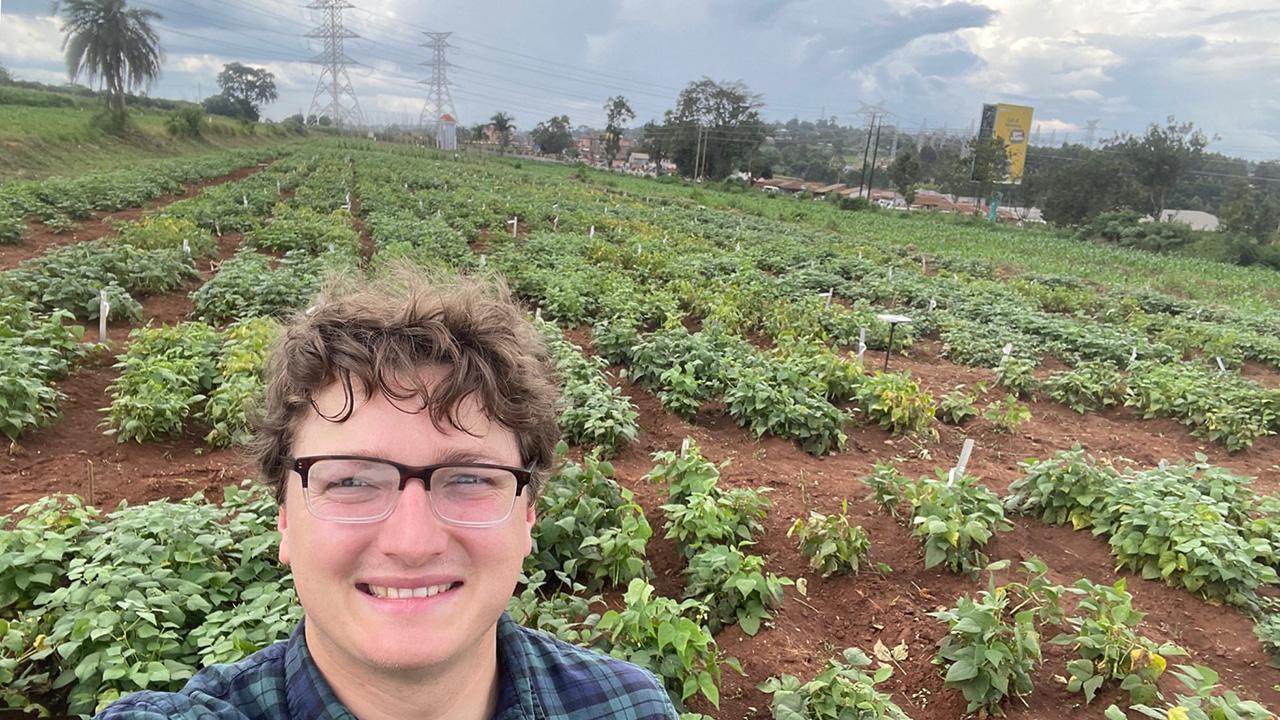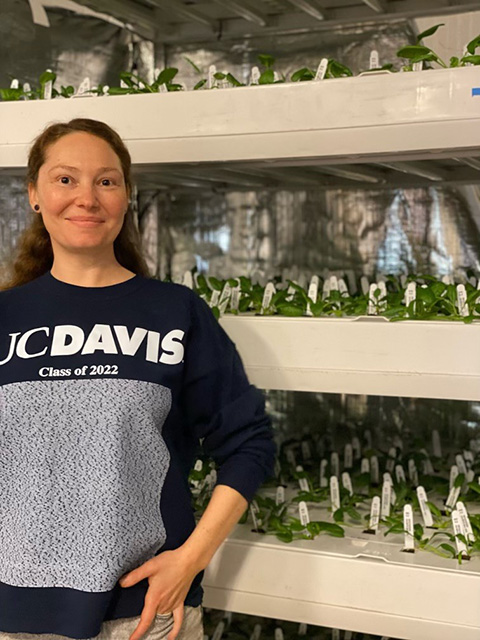
Berlingeri, Forte named Professors for the Future fellows
UC Davis program prepares grad students for teaching, leading

Graduate students Danyelle Forte and Jonathan Berlingeri will join this year’s cohort of fellows in the UC Davis Professors for the Future program, a year-long journey that prepares outstanding candidates for careers in academia and other fields.
The fellowship recognizes the students for their “academic performance, leadership potential, desire to serve the needs of students and scholars and interest in participating in graduate and postdoctoral education,” according to the award letter. The program includes a seminar on college teaching, monthly meetings, a project that must be completed and presented, and a stipend of $3,000.
It is the first time that students in the horticulture and agronomy graduate group have been named fellows to this program.
Berlingeri is in the lab of Christine Diepenbrock, an assistant professor in the UC Davis Department of Plant Sciences. Diepenbrock noted the initiative the fellows are taking to advance their professional development and to also provide resources and information about college-level teaching to the campus and broader community.
“This program helps to even further broaden (participants’) impact and exposure to career opportunities,” Diepenbrock wrote. “It is fantastic that Jonny is being recognized in this way, and I will look forward to seeing what the Fellows carry out this year!”
Forte works with Charlie Brummer, a professor, and Allen Van Deynze, director of the UC Davis Seed Biotechnology Center, both based in the department.
“Danyelle’s an outstanding student who has an excellent future in a plant breeding career, Brummer said. “Educating the next generation of students is obviously critical to prepare future scientists, agronomists, horticulturalists and plant breeders for the challenges facing agriculture. Good researchers are not necessarily good teachers, but through this program, Danyelle will be better able to be an outstanding teacher.”
Berlingeri: Breeding crops for nutrition

Berlingeri is a fourth-year doctoral student. He expects the program would help him discover what he’s capable of and instill lasting confidence. “In particular, I am excited about the opportunity to design and lead an independent, student-led service project,” he wrote.
We asked Berlingeri to tell us more about himself, his research and his goals as a fellow:
Q: Where are you from?
Berlingeri: “I’m originally from Nyack, N.Y., a small town about 20 miles north of New York City. I earned my B.S. from Cornell University, where I first became interested in plant breeding. As an undergraduate, I was exposed to research focused on improving the nutritional quality of crops to address micronutrient deficiencies, and I was deeply drawn to that mission.”
Q: Tell us about your field of study:
Berlingeri: “I’ve continued along that same path, focusing on two main areas: developing improved methods to characterize nutritional traits in leafy greens using sensing technologies, and creating pre-breeding resources for grain legumes. My work with grain legumes involves partnerships with institutions across sub-Saharan Africa, where we are collaborating to improve the nutritional value and productivity of crops like common bean and cowpea by integrating sensing technologies and crop modeling with molecular breeding approaches.”
Q: Why are you interested in this?
Berlingeri: “While private sector roles often prioritize grower-focused traits such as yield and disease resistance, my core interest lies in addressing nutrition-related challenges. From the start of my Ph.D., I’ve been motivated by the opportunity to work on real-world problems with tangible impact. An academic position would offer the flexibility and scope I need to continue this work and contribute meaningfully to improving global nutritional security.”
Q: What do you aim to do after graduating?
Berlingeri: “While I am still exploring the specific roles I may pursue after completing my degree, I believe the best approach is to prepare broadly for the opportunities that align with my interests.
Forte: ‘Shape the future of farming’

Forte is a third-year doctoral student. She expects the Professors for the Future program would “connect me with like-minded students and provide opportunities to build leadership, teaching and mentoring skills that will be valuable throughout my career.”
We asked Forte to tell us more about herself, her research and her goals as a fellow:
Q: Where are you from?
Forte: “I’m from Southern California. As a former chef, I’ve long been interested in food and agriculture. I returned to school to find ways to support farmers and help shape the future of farming.
“Now, I study plant breeding. We work to improve crops by understanding the traits and genetics behind them, so they can better serve farmers, consumers and the environment.”
Q: Why are you interested in this?
Forte: “It’s a way to combine my love for food, farming and problem-solving, while making a real-world impact.”
Q: What do you aim to do after graduating?
Forte: “I may work in the plant breeding industry for a few years, but I’m also passionate about teaching and mentoring future students.”
Media Resources
- Trina Kleist, UC Davis Department of Plant Sciences, tkleist@ucdavis.edu, (530) 754-6148 or (530) 601-6846.
